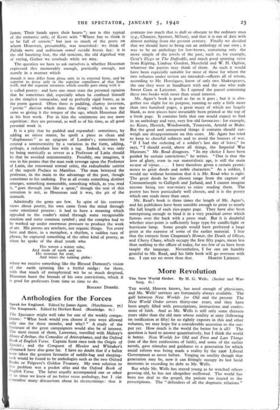Anthologies for the Forces
The Spectator might well take 'for one of the weekly compe- titions : " What book would you choose if you were allowed only one for three months, and why? " A study of the literature of the great campaigners would also be of interest. The most recent of them, Lawrence, travelled with Malory's Morte d'Arthur, the Comedies of Aristophanes, and the Oxford Book of English Verse. Captain Scott once took the Origin of Species ; and the Conquest of Mexico and Whitaker's Almanack have also gone far. I have no doubt that if a ballot were taken the greatest favourite of saddle-bag and sleeping- sack would be found to be anthologies such as the two Oxford Books or Palgrave's Golden Treasury. My own solution to this problem was a pocket atlas and the Oxford Book of English Verse. The latter uspally accompanied one or other of us since we knew of no better verse anthology, but I can
• remember many discussions about its shortcomings: that it
contains too much that is dull or obscure to the ordinary man (e.g., Chaucer, Spenser, Milton), and that it is out of date with almost nothing from the present century. Finally we decided that we should have to bring out an anthology of our own ; it was to be an anthology for low-brows, containing only the more simple of the jewels of the past, such as, for example, Gray's Elegy or The Daffodils, and much good sporting verse from Kipling, Lindsay Gordon, Masefield and W. H. Ogilvie, whatever the purists may think of them. As such it would have been especially suitable for most of those for whom the two volumes under review are intended—officers all of whom, according to Mr. Henriques, know of only two Shakespeares, the one they were at Sandhurst with and the one who rode Sweet Corn at Leicester. So I opened the parcel containing these two books• with more than usual interest.
Mr. Agate's book is good as far as it goes ; but it is alto- gether too slight for its purpose, running to only a little more than two hundred pages, a great many of which are largely blank, as new pieces have invariably been printed at the top of a fresh page. It contains little that one would expect to find in an anthology and very, very few old favourites : for example, no Keats, Herrick, Wordsworth, Tennyson, Arnold or Blake. But the good and unexpected things it contains should out- weigh any disappointment on this score. Mr. Agate has tried to keep to cheerful subjects and to avoid the horrors of war. " If I had the ordering of a soldier's last day of leave," he says, " I should avoid, above all things, the Imperial War Museum." Mr. Read disagrees. " In my choice I have been guided by certain convictions," he writes. " One is that the love of glory, even in our materialistic age, is still the main source of virtue. . . . I have therefore given a certain promi- nence to great deeds and noble characters." As a soldier, I would say without hesitation that it is Mr. Read who is right. The great deeds he has chosen range from the capture of Constantinople to Gallipoli and Jutland, and I cannot imagine anyone being too war-weary to enjoy reading them. The poetry has been particularly well chosen, and it is the poetry which one reads more than once.
Mr. Read's book is three times the length of Mr. Agate's, and his publishers have been sensible enough to print to nearly the full length of each rice-paper page. They have also been enterprising enough to bind it in a very practical cover which fastens over the back with a press stud. But it is doubtful whether nine-point is sufficiently large type for candle-light or hurricane lamp. Some people would have preferred a large print at the expense of some of the earlier material. I fear that the extracts from Chapman's Homer, the Death of Oliver, and Chevy Chase, which occupy the first fifty pages, mean less than nothing to the officer of today, for too few of us have been
taught the language. Nevertheless, I for one am humbly grateful to Mr. Read, and his little book will go overseas with
me. I can say no more than that. MARTIN LINDSAY.


































 Previous page
Previous page